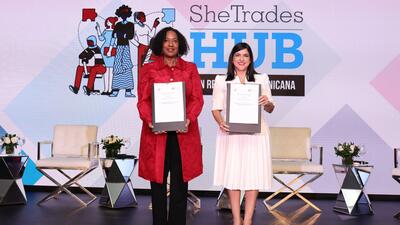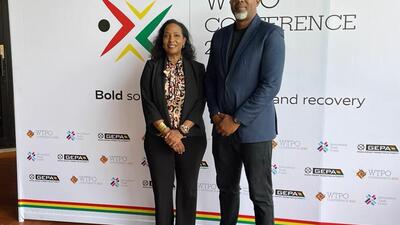Trade and women's economic empowerment (en)
11 February 2016 - Barbados
Ladies and Gentlemen.
Friends.
It gives me great pleasure to be here in Barbados with you today, as part of my first official visit to the Caribbean as head of the International Trade Centre.
Let me start by thanking my hosts, the University of the West Indies. The Shridath Ramphal Centre hosted at UWI has played a critical role in equipping Caribbean institutions with the skills and analytical capacity the region needs to be more competitive in the international trading system. UWI has produced many of the top minds in the Caribbean who have given so much to the global discussions on trade, climate change, human rights and women’s rights.
I’d like to take a moment to introduce the International Trade Centre, and explain why women’s economic empowerment is at the heart of what we do. Founded in 1964, ITC is a joint agency of the United Nations and the World Trade Organization, with a mandate to help small and medium-sized enterprises in developing countries connect to international markets. We focus on SMEs because they employ the vast majority of people. We focus on trade because businesses that import or export tend to be more productive, they grow faster, and generate higher-quality, better-paying jobs.
Connecting to international value chains isn’t straightforward. In order to do so, SMEs need to boost their productivity and competitiveness. To help make this happen, ITC works with policymakers to improve the business environment. We work with trade promotion agencies and business associations to improve the support they offer to entrepreneurs seeking to trade. And we work with the companies themselves.
So what does this look like in practice? In Haiti, our Ethical Fashion Initiative has connected the artisanal skills of hundreds of workers to the top of the international fashion market. The result: brands like Brazil’s Osklen, Italy’s Coin, and potentially Gucci next, are selling hand-painted bracelets, papier-mâché pieces, carved horn bangles, hats and other accessories made in safe working conditions in Port-au-Prince by women who are paid a decent wage. This didn’t happen overnight. The project team worked with a group of tiny, previously informal, businesses to help them upgrade product quality, raise labour standards, and connect to the eventual buyers. It engaged with government agencies to identify and smooth potential trade obstacles. The model works. The Ethical Fashion Initiative’s oldest hub, which started in one of Nairobi’s poorest slums, is now fully commercially viable. In fact, a group of private investors took it over last year.
At ITC, we believe that modest, targeted aid interventions can empower people to connect to world markets, building economic and social resilience that endures long after donor support is withdrawn. That’s why we describe our work as creating trade impact for good.
Why women’s economic empowerment matters…
‘For good’ cannot happen without women. Lasting social and economic progress is impossible unless women are economically empowered and socially respected. Women’s empowerment and trade are mutually reinforcing – trade supports women to become empowered, and empowered women contribute disproportionately more to the economy and society.
The Global Goals for Sustainable Development adopted last fall by the world’s governments at the United Nations aim to eradicate extreme poverty by 2030. Gender equality and the women’s empowerment rightly figure high on this new agenda. If we’re going to meet that target, it’s time for all of us - policymakers, the private sector, the broader development community, and civil society, including students, - to move from talk to action. Women are overrepresented among the world’s poorest, but are critical to lift societies out of poverty.
Women’s economic empowerment isn’t just a moral imperative; it’s a practical one. ITC recently hosted an event on Women in Business in Nairobi where I was pleased to welcome the Minister of Foreign Affairs and Foreign Trade of Barbados the Hon. Maxine McClean to contribute. One of my fellow panellists said “When Kenyan men make money, bars make money. When Kenyan women make money, it goes to schools and hospitals.”
Gentlemen, you now know what not to do! Jokes aside, the fact is when women are paid for their work, and have control over how the money gets spent it creates benefits that last for generations. Women invest much more of their income in their families’ education and health than men do. Studies have found that whenever a greater share of household income is controlled by women, spending patterns change in ways that benefit children. And these healthier, better educated children are our future.
The benefits of women’s economic empowerment go far beyond the household level. I’m a football fan myself, but since I’m in Sir Garry Sobers’ home country, I will attempt a cricket analogy: no team can leave half its players in the pavilion and expect to win. And no country can leave half its population on the margins of the economic playing field and expect to reach its full potential.
When more women work, economies grow. Researchers estimate that 865 million women around the world could be contributing more robustly to their countries’ economies. Think about that for a second: nearly a billion women either prevented from becoming full economic actors, or who lack the skills or the credit to do so. These women have been called a ‘third billion’, who could follow China and India into the global economy, transforming their lives and improving economic prospects for all of us.
The aggregate cost of gender inequality is staggering. McKinsey recently estimated that if women participated in the economy on equal footing to men, with equal wages and labour force participation, it would add up to $28 trillion to global GDP by 2025. That’s a 26% increase over business as usual – like adding a new US and China to the world economy. Even a more modest scenario, where countries match the gender parity of their best-performing regional neighbour, would add $12tn to the global economy – the collective economic size of Japan, Germany, and the UK.
Greater economic opportunities for women are consistently correlated with higher competitiveness and national income. For small, relatively undiversified island economies like most in the Caribbean, fully capitalising on the potential of women is essential to building resilient growth and reducing economic vulnerability to external events like weather, commodity price swings, drops in tourist arrivals, or cuts in development assistance. Not to mention vulnerability to climate change.
There’s good news though: countries in Latin America and the Caribbean have been taking great strides towards closing the gender gap. Barbados, in fact, is doing better than most.
But I’ll come back to that later. As we’ve seen, the macroeconomic case for women’s empowerment is clear. It also makes good business sense. Fortune 500 companies with women on their executive boards are more profitable than competitors with all-male leadership. The higher women go up the corporate ladder, the better it is for organisational effectiveness.
This ‘break-the-glass-ceiling bonus’ extends to smaller businesses as well. Firm-level evidence is emerging from the United States that the exporter premium – the pay premium at exporting firms over non-exporters – is higher for women-owned businesses than for those owned by men.
In SMEs, ownership counts. Male-owned SMEs tend to have very few women in senior roles. For SMEs owned by women, it’s the opposite. That’s why encouraging women entrepreneurs is so important.
Major obstacles to be overcome
I just told you that companies with women leaders are more profitable. Yet only 4% of the leading 500 US corporations are led by female CEOs. There are more CEOs named John than there the total number of women CEOs in that group. Even apart from the very top job, women are sorely underrepresented in the top echelons of management.
The fact is that too many women, in too many places, face an uphill climb from childhood onwards. Girls who are not given equal access to education. Women entrepreneurs whose businesses must overcome unequal access to land, capital, and information. Sociocultural expectations about caring work, child-rearing and household duties, together with social policy choices on childcare and maternity leave, weigh disproportionately on women entrepreneurs and employees. This leaves women with less time to invest in paid work, networking and skills building.
Laws and behaviour
And it’s not just informal norms and traditions. A recent World Bank survey found that 155 countries still had at least one formal law impeding women’s economic opportunities. Women face gender-based job restrictions in 100 countries, often confining them to low-paying activities, more often than not in the informal sector. In 18 countries the law gives husbands the right to prohibit their wives from working outside the home. Women in several countries face extra documentation hurdles when trying to get a national identity card. Beyond making it tougher to access public services or contracts with others, no proof of ID means no chance of getting a bank loan to start or expand a business.
Laws have long-lasting economic and social consequences. In the 46 countries that do not have laws protecting women from domestic violence, women have shorter lifespans. Gender based job restrictions tend to be associated with wider wage gaps and lower employment rates for women. On the flip side, good laws, properly implemented and enforced, can nudge forward positive changes in social and cultural mores.
To take one example, before Norway introduced the ‘father’s quota’ of parental leave in 1993, only 2% of men took time off work after the birth of a child. Today, more than 90% do. Fathers who take parental leave to bond with their infant children end up doing more diapers, and staying more involved with childcare. This leaves more time for mothers to do paid work.
Such policies are not just for rich countries. Jordan recently passed a broad social insurance reform law that will use a payroll tax to support unemployment, health, and maternity benefits, even in micro-firms. Earlier, the obligation to pay for maternity coverage might have dissuaded some private sector employers from hiring women. Legal reforms can encourage social change, but making change happen is up to each and every one of us – including, indeed especially, men! Because, even if the amount of unpaid work done by women around the world is roughly equal to the GDP of China, this work needs to be done. A lot of it can’t easily be commercialised: in theory, I suppose you could pay your neighbour to take care of your kids, and vice versa, but does that make much sense? If we are to achieve economic equality for women, men need to step up in the home, in the community, and in the workplace, and share the burden.
Caribbean accomplishments
The Caribbean, as I was saying earlier, has made enormous progress towards gender equality in recent years, especially in politics and the workplace. According to the World Economic Forum’s most recent Global Gender Gap report, in the years since 2006, only one region has done more than Latin America and the Caribbean region to reduce gender gaps in economic participation and political empowerment. Thanks to an increase in the number of female legislators, senior officials, managers, and professionals, Barbados did more than any other country in the region to narrow inequalities in opportunity for women. Indeed, Barbados is one of only 14 countries in the world where the Human Development Index score – which measures health and education as well as economic output – is higher for women than for men.
That said, there is wide variation in performance across different Caribbean countries, and much remains to be done to reduce gender gaps in employment, wages, entrepreneurship rates, and education. Political representation, too, remains lopsidedly male, though our colleagues at UNWomen are working to reverse this by bringing lessons to the region from the undisputed world leader in women’s political clout. Any guesses about which country I’m talking about? It’s Rwanda, where over 60% of parliamentarians are women.
Finance, technology, and ITC’s role in empowering women
Specific policies for financing, technology, and other business support can help women-owned enterprises thrive, generating high social and economic returns. While women own somewhere around a third of all SMEs in developing countries, they are less likely than men to have formal bank accounts or loans. This is likely part of the reason only about a fifth of exporting firms are owned by women.
The unmet need of women-owned businesses for capital, which is estimated at between $260 billion and $320 billion per year, is the biggest barrier to their growth and development. Even when they can get credit, women-owned businesses have less access to other financial services, such as insurance.
From access to finance, to access to the internet: most of you in this room probably have smartphones. So it might come as a surprise to learn that across the developing world, nearly 25 percent fewer women than men have access to the internet. This digital gender divide is an obstacle to education: 75 percent of women in developing countries use the internet for educational purposes.
It’s also an obstacle to business competitiveness. Connectivity is particularly important in Caribbean countries, where manufacturing sectors are small and services like business process outsourcing offer rich potential for growth and job creation. For an app developer here or in Saint Lucia, being on an island doesn’t matter: a good internet connection is what counts. Good internet access can open new horizons for small businesses dealing in physical merchandise: eBay or Etsy and access to a digital payment system like PayPal are all a Jamaican swimwear designer needs to become a ‘micro-multinational’ SME selling to customers around the world.
At the International Trade Centre, women’s economic empowerment is an agency-wide preoccupation, and is reflected in every aspect of our work.
By raising awareness of the challenges faced by women entrepreneurs, and by providing evidence-based solutions, we enable governments to improve the policy and regulatory environment. For instance, because women-owned firms tend to be smaller, they are disproportionately affected by fixed costs related to trade, such as those associated with complying with non-tariff measures like health and safety standards. Policy reforms can keep these costs to a minimum.
Whether it’s with national-level business forums or a small association of traders informally selling fruit across the Uganda-Kenya border, we work with trade and investment support institutions to better equip them to give women entrepreneurs the support they need to connect to international opportunities. In Saint Lucia, for example, we work with the Trade Export Promotion Agency to help them make trade and market information more readily available to prospective exporters.
Connecting women-owned businesses to prospective buyers is sometimes all that is needed to make trade start flowing. That’s why we organise business-to-business meetings, and work with governments and big businesses to encourage them to source more women-owned enterprises. Even a small increase in the total share of public and corporate procurement would mean billions of dollars’ more business for women-owned businesses.
It’s also why we’re working to develop new tools to make it easier and cheaper for women-owned businesses to connect to buyers – and to each other. Last December, we launched "SheTrades", a new web and mobile app for women entrepreneurs. Women-owned businesses from around the world can use the app to showcase the goods and services they offer. Prospective buyers can use customised filters to identify companies that meet their requirements. SheTrades – I urge you to check it out at SheTrades.com – was developed by a women-led Kenyan tech company, GreenBell Communications, after it won a global tech challenge co-sponsored by ITC, Google and the Brazilian firm CI&T.
The SheTrades app is part of a bigger initiative we have launched, together with governments, the private sector, international organisations, and civil society, to connect one million female entrepreneurs to markets by 2020. Last year, we issued a Call to Action setting out a framework for companies, governments, and other organisations to make specific, measurable pledges that contribute to this goal. Multinationals, for instance, can pledge to source more from suppliers owned or run by women. Banks can pledge to ensure better access to finance, as Barclays Bank has done in Kenya. Governments can pledge to reform discriminatory laws, while academics can collect and publicise sex-disaggregated data on women’s participation in the economy.
The payoffs for investing in girls and women, from better education through to expanded economic opportunities, are impressive. Barbados is a leader in this. UWI-Cave Hill with its Chancellor Professor Eudine Barriteau is a leader. Be an example.
Thank you for your attention.







